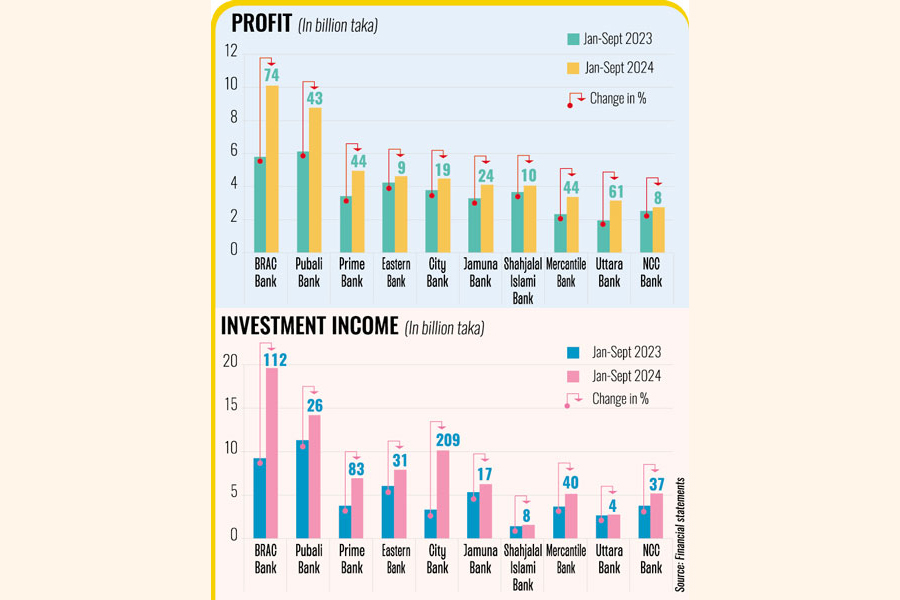
Published :
Updated :

Most of the listed banks secured a double-digit profit growth year-on-year in the nine months through September this year, driven by substantial income from investments in government securities.
The net interest income, the core source of income for banks, was not as significant.
Reputable banks reaped handsome profits from investments in government securities alongside high interest income. However, interest expenses on deposits were high too.
The yield rates of T-bonds ranged between 12 per cent and 15 per cent, with maturity periods of 2-20 years, while T-bills' yields varied between 15 and 16 per cent during the time.
The leading banks have always been able to keep operating costs down and mobilize funds at relatively low costs due to their market reputation.
Salim Afzal Shawon, head of research at BRAC EPL Stock Brokerage, said the well-performing banks' deposit growth shot up after the removal of the lending rate cap and return to a market-driven interest rate regime but corporate lending remained slow.
"Banks with high liquidity parked funds in the government securities for better return at low default risk," said Mr Shawon.
Banks enjoyed better investment opportunities amid higher interest rates on government securities, said Syed Mahbubur Rahman, managing director of Mutual Trust Bank.
The lenders that wisely made good investments in Treasury bills and bonds received higher returns alongside higher interest income due to market-based interest rates, he added.
Of the 33 banks that published their financial statements, 20 saw their profits go up 4-163 per cent year-on-year in the nine months through September. Eleven others registered lower profits in the period compared to the same period last year. Exim Bank went into the red afresh in January-September while ICB Islami Bank continued to be on its decade-long journey of losses.
The banks' combined net interest income grew 18 per cent year-on-year to Tk 229 billion in January-September while their investment income jumped 48 per cent to Tk 171 billion during the period compared to the corresponding period last year.
The banks' collective net profits, however, dropped nearly 4 per cent to Tk 73 billion in the nine months through September this year. Exim Bank alone reported a loss of Tk 4.01 billion during the period.
Government securities paid more than 12 per cent interest in the nine months to September.
"That basically helped banks gain," Mr Rahman said.
Income in the form of exchange and brokerage commissions also surged in January-September as the securities regulator lifted the floor price in January this year.
Growth relying on investment income
While interest income grew due to the removal of the lending rate cap in July last year and the introduction of market-based rate in May this year, interest payment to depositors and lenders also went higher.
The financial sector returned to market-driven interest rates after four years at the prescription of the International Monetary Fund (IMF) in order to step up its fight against inflation.
As a result, net interest income of some banks declined year-on-year during the period under review, but higher income from investments, particularly in government securities, helped them secure higher profits.
For example, BRAC Bank's net interest income fell 18 per cent year-on-year to Tk 12.58 billion in January-September.
On the other hand, its income from government securities more than doubled to Tk 19.65 billion, driving the profit to a record Tk 10.10 billion, a 74 per cent jump from the same period the year before.
BRAC Bank's income from subsidiaries, particularly bkash, also boosted income. Bkash witnessed a 148 per cent year-on-year escalation in income to Tk 2.18 billion in the nine months through September this year.
City Bank's nine months' consolidated profit also rose nearly 19 per cent year-on-year to Tk 4.51 billion, riding on significant income from investments in government securities.
Real strength of some lenders exposed
Eleven banks experienced a 6-274 per cent year-on-year decrease in profit during the nine-month period mainly due to higher provisions against loans and advances.
Some interest income against bad loans that accrue on paper but are not earned in reality needs to be excluded from the profit and loss accounts.
According to the rules, every lender has to set aside a certain amount of its income proportionately with non-performing loans. The amount is called provision.
Some banks reported losses in the July-September quarter, owing to corrupt lending practices by their directors, which got exposed in the media under the interim government following the ouster of the Hasina-led government.
Recently, the central bank said lenders would have to treat a loan as overdue if a borrower did not make an installment payment within three months after the due date of repayment, which was earlier six months.
Following the Bangladesh Bank's tightened measure to maintain adequate provisions against non-performing loans, the real financial condition of these institutions has been exposed in the recently-published financial statements.
Exim Bank suffered a loss of Tk 5.66 billion in the July-September quarter as it kept provisions of Tk 7.98 billion during the quarter.
Consequently, its losses amounted to Tk 4.01 billion for July-September, as opposed to a profit of Tk 2.29 billion in the same quarter last year.
An official of Exim Bank, requesting not to be named, said the previous chairman had left a substantial amount of toxic loans and other debts with a thin chance of repayment.
"We wrote off loans that were deemed unrecoverable, leading to a significant increase in provisioning, which contributed to our losses," he said.
The overall volume of non-performing loans in the banking sector reached a record high of over Tk 2.11 trillion as of June this year, according to the Bangladesh Bank.
babulfexpress@gmail.com


 For all latest news, follow The Financial Express Google News channel.
For all latest news, follow The Financial Express Google News channel.